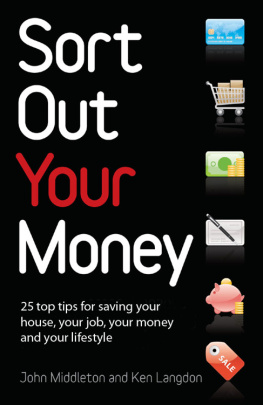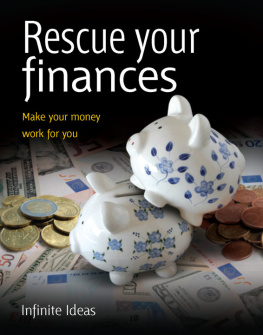Sort out your money
25 top tips for saving your house, your job, your money and your lifestyle
John Middleton and Ken Langdon

8. First save, then spend
Money is human happiness in the abstract.
ARTHUR SCHOPENHAUER, pessimist and philosopher
In January 2008 the Deloitte Economic Review suggested that during this recession the City would cut between 10,000 and 20,000 jobs. Thats 2.55% of the City workforce. If this were to be repeated across the economy it gives a frightening number. There are about 30 million people working in the UK; so 5% losing their jobs would amount to 1.5 million people. So you need to start to think about 2 areas making sure youre not one of the statistics and saving a buffer of money so that if the worst does happen youve got a bit of money to tide you over while you find another job.
KEY MESSAGE An unfortunate truth about losing your job in a recession is that nobody expects it to happen to them. Make sure you know why you really are an essential member of staff providing your employer with value for money.
What do you need to do now? Note it down.
(Incidentally, one of the reasons for job losses in the City is that employers say to their workforce Look, shall we cut back severely on the champagne life style, cut expenses and trim bonuses and even salaries, given that the alternative is to sack people? The workforce always votes to keep the champagne life style and cut the jobs, thereby proving that you dont have to be mad as well as greedy to work in the City but it probably helps if you are.)
Next you need a buffer of two to three months worth of your monthly spend, so youve got to save it if you dont have it already. If you find it difficult or impossible to save money, heres an approach that will enable you to divert some of your monthly discretionary spend into a savings account.
Lets be clear building up your savings is a very good thing to do and an excellent habit to get into. As well as warding off emergencies such as redundancy, savings can enable us to plan for the future. When big expenses happen, you have three basic options: (a) draw on your savings; (b) go into debt; (c) write a snappy begging letter. If option (a) isnt available because you have little or no savings, youre left with unpleasant option (b) or unlikely option (c).
But what if there isnt anything left over at the end of the month to put into a savings account? Dont get suckered into a not today, maybe tomorrow attitude to saving. Most of us spend what we earn; if our pay goes up, we upgrade our lifestyle and were soon spending what we earn again. Against this backdrop, you can see the flaw in looking to save whatever is left over in your account at the end of each month. Instead try saving and then spending. In other words, set aside a certain amount each month as savings, and then make the remainder your budget for the month. This is easily achievable for most of us when you consider that on average around 20 per cent of household expenditure goes on leisure.
KEY MESSAGE Save, save, save
If you dont have a savings mentality, try setting yourself a goal such as having three to six months salary set aside for emergencies. This gives a bit of meaning and purpose to the idea of saving. Try setting up a standing order from your current to your savings account, and make sure it goes out early in the month. Make it a reasonable yet affordable amount. To help avoid any temptation to dip into your savings, set up the savings account so that the money youve saved isnt too readily accessible, such as an account where you have to give notice before you can make a withdrawal. A friends son is a salesman on bonus and when has an unusually good month, he puts the bonus into a savings account his dad set up in his name for the purpose. He still has access to his money any time he wants it but he has to deal with his dad tutting and looking as stern as he can if he wants to get hold of it.
What do you need to do now? Note it down.
Any questions?
Q Ive set up a savings account but I seem to be dipping into it at regular intervals. What can I do differently?
A Spend a few moments reviewing the circumstances under which youre drawing money out of your savings account. If youre taking money out to help you cover day-to-day expenses, then its possible that you havent psychologically adjusted to the fact that your savings should be untouchable except in extreme circumstances. Have another look at your areas of discretionary spend; if you conclude that its realistic to save something each month, then youll need to discipline yourself not to touch your savings unless the circumstances are right. Perhaps get someone else to own the savings account so that there is an extra step and a disapproving look when you go to get it back.
Q Im getting confused by the fact that there are so many different ways to save. Whats the best?
A Its a matter of knowing why you are saving. If you are saving for an event thatll take place in the next couple of years, then you are better off with a cash-based investment. If, however, your children are still at school but you know that they will be heading to university in five years, then its a good idea to consider investing for growth in the stock market. But do remember, theres a recession around! Theoretically its a good time to buy but manage your portfolio of risk carefully dont get too high risk.
9. Declutter and prosper
If more of us valued food and cheer and song above hoarded gold, it would be a merrier world.
J. R. R. TOLKEIN
Having a rainy day pot of money is most important during a recession. As well as putting money into a savings account, learn some tips and wrinkles for realising value from unwanted assets in your attic and around your home.
If your home is anything like mine, its awash in clutter. Aside from the ominous feng shui implications of this clutter and the fact that it offers a des res to rats and mice, there are some real financial benefits to be gained from minimising the stuff we have to provide space for, take care of and insure. Its said to be better to give than to receive. In this instance, Id suggest that its often better to sell than to keep.
Along with online auction sites, lets not forget that there are less high-tech ways of offloading your unwanted stuff. Every weekend we flock in our droves to car-boot sales and village hall jumble sales. Because the money tends to come in bits and pieces 50 from a car-boot sale, a 10 cheque from an eBay buyer, fortnightly credits to your chosen bank account from Amazon, and so on theres a danger that the financial benefits of decluttering are dissipated. Instead set up a separate savings account as a home for the proceeds from these sales and see how cheering it is to watch the total steadily grow.
If youre new to the car boot sale game here a few pointers to try to ensure that you sell what you take and get the best price for it:
1.Its easy to find your local car boot sales and a calendar of when theyre on the Internet: just Google search car boot sales and your district.
2.Go to at least one sale before you pay the money to have your own stall. Look at the tables that make you want to visit them and look at the goods and copy them. Use this visit to get an idea of the price of the things youre going to sell.
3.Dealers tend to be the first there: so dont sell to them until the general public is there in numbers. Dealers always pay less than you should get.
4.A wallpaper-pasting table is a good stall as it folds to get in the car.
5.Try to price label your goods the day before: you tend to put a higher but still realistic price on things if youre not making it up on the spot. Besides it looks professional and makes it easy to buy.
Next page
















